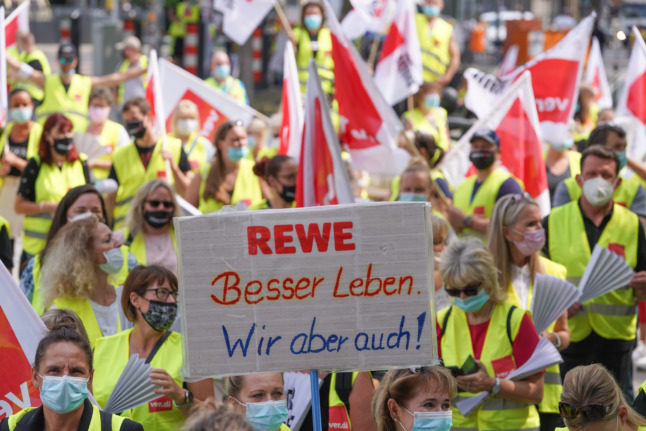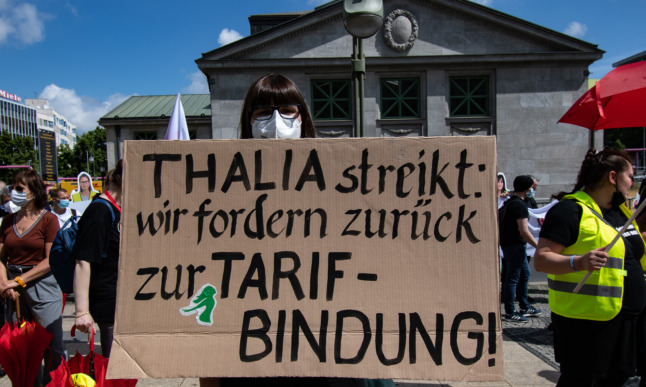The trade union behind the retail strikes – Verdi – said Monday’s action would impact several branches of IKEA, Rewe, Kaufland, Galeria Karstadt Kaufhof, Edeka, Thalia, Cos, H&M and Primark across Berlin and Brandenburg.
It will also target the Rewe warehouses in Oranienburg and Mariendorf.
The strike arrives just days after Verdi called an indefinitely walkout at Berlin’s largest hospital, Charité, after negotiations with its parent company faltered.
In a statement announcing Monday’s strikes, Verdi said talks over pay increases in the retail sector had come to a standstill.
Workers are calling for a 4.5 percent pay rise this year, in addition to a training allowance and a €45 bonus each month.
They also want to negotiate a “pension-proof minimum wage” of €12.50 per hour for all shop workers. According to the union representatives, their goal is to ensure that any agreement reached between the employers and the union would apply across the board in the retail sector for an initial period of nine months.
READ ALSO: German train drivers announce strikes after pay talks collapse
Meanwhile, the retail companies have proposed a two percent increase in wages this year, plus a one-off bonus payment of €300. This would be followed by a further 1.4 percent increase from July 2022 and a further two percent in July 2023.
However, the agreement would initially only apply to shops that weren’t affected by forced closures during the Covid pandemic – so, realistically, only the supermarkets would follow this timeline.
The other retail outfits would be able to postpone this year’s wage increases until next year.
‘Incredibly angry’
As workers prepared for the walkout on Monday, Conny Weißbach, negotiator and head of the Berlin-Brandenburg trade department, said the workers were “incredibly angry” about the lack of progress in negotiations.
She pointed out that, with Germany’s 3.8 inflation driving up the cost of living, retail workers would still end up less well-off than before under the retail chains’ proposals.
READ ALSO: German consumer prices rise by highest level in three decades on back of pandemic measures
“This year, (a two percent pay rise) would mean a loss of wages in real terms,” she said. “Shop assistants would have less in their wallets than before.
“Moreover, it does not in the least do justice to the extraordinary burdens of the employees – and this in the face of enormous increases in turnover in the retail sector.”

Striking Rewe workers quote the company’s slogan – “Live better” – on a placard that reads “Rewe – Live Better. But us too!” Photo: picture alliance/dpa | Jörg Carstensen
Striking workers gathered at their central strike location at Berlin’s Breitscheidplatz on Monday morning, where there were performances and talks.
Left Party politicians Gregor Gysi and Gesine Lötzsch and Social Democratic Party deputy leader Kevin Kühnert offered their support to strikers.
“The employers must finally accept their social responsibility at the next negotiations on September 16th,” Weißbach said. “The shop assistants have not only more than earned a real wage increase, they also need it.”
Wave of strikes
Monday’s retail strikes have come at a turbulent moment in German industrial relations, following repeated strikes by the GDL train drivers’ union and ongoing hospital strikes in Berlin.
On Thursday, Verdi called on workers at Berlin’s Charité hospital and its parent company, the Vivantes Hospital Group, to commence an indefinite walkout in a fight for better working conditions and wages.
Dorothea Schmidt, Vivantes’ HR managing director, said the timing of the strikes was “completely incomprehensible” given that the company had put forward proposals for taking pressure off nursing staff and agreed to consider the unions’ other demands the previous Monday.
Talks have been called off during the strikes.
Meanwhile, on Friday, Deutsche Bahn announced that it would be making an “improved offer” to the GDL union in an attempt to stave off another walkout, which was due to be planned on Monday.
READ ALSO: Are the German rail strikes going to end soon?
However, as of Monday, the GDL had yet to respond to the offer. In a press statement on the GDL website, the union said it would “evaluate the offer” and inform people of further steps “in due course”.



 Please whitelist us to continue reading.
Please whitelist us to continue reading.
Member comments